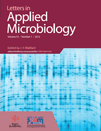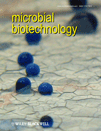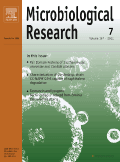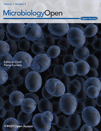
LETTERS IN APPLIED MICROBIOLOGY
Scope & Guideline
Connecting Experts Through Groundbreaking Microbial Studies
Introduction
Aims and Scopes
- Microbial Pathogenesis and Resistance:
Research focusing on the mechanisms of microbial pathogenesis, antibiotic resistance, and virulence factors in bacteria and fungi, including studies of multi-drug resistant strains. - Biocontrol and Environmental Microbiology:
Studies that explore the use of microorganisms for biocontrol of pathogens in agriculture and food safety, as well as the role of microbes in environmental remediation and sustainability. - Microbial Biotechnology and Applications:
Innovative applications of microbiology in biotechnology, including fermentation processes, probiotics, and the synthesis of bioactive compounds from microbial sources. - Food Microbiology and Safety:
Research on the microbiological safety of food products, including the detection of pathogens, spoilage organisms, and the development of antimicrobial agents derived from natural products. - Probiotic and Prebiotic Research:
Studies investigating the health benefits of probiotics and prebiotics, their mechanisms of action, and their role in gut health and disease prevention. - Molecular Microbiology and Genomics:
Advancements in molecular techniques for the identification and characterization of microorganisms, including the use of genomic and metagenomic approaches.
Trending and Emerging
- Antimicrobial Resistance Mechanisms:
There is a growing emphasis on understanding the genetic and biochemical mechanisms of antimicrobial resistance in various microorganisms, particularly in the context of clinical isolates. - Microbial Interactions and Community Dynamics:
Research exploring the interactions within microbial communities, including synergistic and antagonistic relationships, is on the rise, reflecting a more holistic approach to microbiology. - Natural Products and Bioprospecting:
An increase in studies focusing on the discovery and application of antimicrobial agents and other bioactive compounds derived from natural sources, including plants and microorganisms. - Sustainability and Environmental Microbiology:
Research addressing sustainable practices in agriculture, waste management, and bioremediation is trending, emphasizing the role of microorganisms in environmental health. - Probiotic and Gut Microbiome Research:
There is a significant increase in studies examining the health benefits of probiotics and the gut microbiome, including their roles in disease prevention and health enhancement. - Novel Diagnostic Techniques:
Emerging trends in the development and application of rapid diagnostic methods, including molecular techniques and biosensors, are becoming increasingly prominent in microbiological research.
Declining or Waning
- Traditional Antibiotic Development:
Research focused on the development of new traditional antibiotics has decreased, possibly due to the increasing interest in alternative approaches such as phage therapy and the use of natural compounds. - Single-Organism Studies:
There is a noticeable reduction in studies that focus solely on single-organism models. The trend has shifted towards more complex interactions within microbial communities, reflecting a growing understanding of microbial ecology. - Basic Microbial Physiology:
Research concentrating solely on fundamental aspects of microbial physiology without practical applications has declined as the field moves towards applied and translational research. - In vitro Studies without Contextual Application:
The frequency of in vitro studies that do not directly translate to practical applications in health, agriculture, or industry has waned, as researchers increasingly strive for relevance in real-world scenarios.
Similar Journals

CANADIAN JOURNAL OF MICROBIOLOGY
Championing Excellence in Microbial ScienceThe Canadian Journal of Microbiology, published by Canadian Science Publishing, is a well-respected journal established in 1954 that serves as a vital platform for advancing knowledge in the fields of microbiology and related disciplines. With an ISSN of 0008-4166 and an E-ISSN of 1480-3275, this journal is recognized for its rigorous peer-review process and its commitment to disseminating high-quality research that spans applied microbiology, biotechnology, genetics, immunology, and more. Currently indexed in several prestigious databases, its impact factor and category quartiles highlight its significance, ranking in the top tiers of applied microbiology and biotechnology as well as other intersecting fields. The journal provides an essential resource for researchers, professionals, and students seeking to stay informed on the latest advancements and breakthroughs, facilitating collaboration and innovation in the microbiological sciences. Set in the dynamic landscape of academia from its headquarters in Ottawa, Canada, the Canadian Journal of Microbiology remains steadfast in its mission to promote research that addresses key challenges and opportunities within the microbiological community.

FOOD SCIENCE AND BIOTECHNOLOGY
Advancing the Future of Food and BiotechnologyFOOD SCIENCE AND BIOTECHNOLOGY, published by the Korean Society of Food Science & Technology (KOSFOST), stands as a prominent peer-reviewed journal dedicated to advancing knowledge in the fields of food science, biotechnology, and applied microbiology. With ISSN 1226-7708 and E-ISSN 2092-6456, this journal serves as a pivotal platform for disseminating high-impact research from South Korea and beyond, reflecting a robust Q2 ranking in multiple categories including Applied Microbiology and Biotechnology, Biotechnology, and Food Science as of 2023. The journal's influence is further emphasized by its positions in various Scopus ranks, where it showcases a commendable percentile ranking in Agricultural and Biological Sciences and Biochemistry. Although access options remain limited, the journal’s objectives revolve around the publication of innovative research, fostering interdisciplinary collaboration, and facilitating the exchange of ideas among a diverse community of researchers, professionals, and students. Whether you are involved in food technology, microbial biotechnology, or nutritional sciences, FOOD SCIENCE AND BIOTECHNOLOGY are instrumental in shaping the future of these critical fields, propelling advancements that enrich our understanding of food systems and health.

Microbial Biotechnology
Unlocking the potential of microbes for global impact.Microbial Biotechnology, published by WILEY, stands at the forefront of innovation in the field of applied microbiology and biotechnology, showcasing cutting-edge research and advancements within both academic and industrial contexts. As an Open Access journal since 2012, it ensures that high-quality research is easily accessible to researchers, professionals, and students globally, promoting knowledge sharing and collaboration. With an impressive impact, the journal holds a Q1 ranking in its categories—Applied Microbiology and Biotechnology, Biochemistry, Bioengineering, and Biotechnology—demonstrating its significance in the scientific community. The journal currently boasts a strong Scopus ranking in several relevant disciplines, including a top 10% position in Applied Microbiology and Biotechnology, highlighting its critical role in disseminating influential findings. Designed to foster dialogue and advance technology within the microbial sciences, Microbial Biotechnology is an essential resource for anyone committed to leveraging microbial processes for sustainable and innovative solutions.

ARCHIVES OF MICROBIOLOGY
Advancing the Frontiers of Microbial ScienceThe Archives of Microbiology, published by Springer, is a reputable journal in the field of microbiology, serving as a vital platform for the dissemination of groundbreaking research and critical reviews since its inception in 1974. With an ISSN of 0302-8933 and an E-ISSN of 1432-072X, this journal operates out of Germany and maintains a global reach, promoting high-quality scholarship across multiple disciplines, including biochemistry, genetics, and molecular biology, as evidenced by its Q2 ranking in Medicine (miscellaneous) and consistent Q3 placements in other categories in 2023. Although the journal does not offer open access options, its rigorous peer-review process ensures that published articles are of the highest standard, making it an essential resource for researchers, professionals, and students keen on advancing their understanding of microbial sciences. As the journal converges toward 2024, it remains committed to fostering innovative microbiological research and facilitating interdisciplinary dialogue within the scientific community.

Malaysian Journal of Microbiology
Pioneering Research in Infectious Diseases and Microbial ProcessesMalaysian Journal of Microbiology is a prestigious open-access journal dedicated to advancing the field of microbiology, published by the Malaysian Society for Microbiology. Since its inception in 2005, this journal has become an essential platform for researchers and practitioners, facilitating the dissemination of innovative studies in applied microbiology, biotechnology, and infectious diseases. Based in Penang, Malaysia, this journal not only focuses on local microbiological research but also positions itself within the broader global scientific community. Although currently placed in the Q4 category in several relevant fields—including Applied Microbiology and Biotechnology, Infectious Diseases, and Medical Microbiology according to the 2023 Scopus rankings—it plays a crucial role in encouraging novel research and fostering collaboration among scientists. The journal encourages submissions that contribute to the understanding of microbial processes, disease mechanisms, and novel biotechnological applications, thereby supporting the continuous growth of knowledge in microbiology. With open access since its launch, the Malaysian Journal of Microbiology ensures that all published works are freely available to the public, enhancing their visibility and impact within the scientific community.

MICROBIOLOGICAL RESEARCH
Elevating Knowledge in Microbiology and ImmunologyMICROBIOLOGICAL RESEARCH, published by Elsevier GmbH, serves as a leading platform for advancements in the field of Microbiology, holding an impressive Q1 ranking in its category as of 2023. With an ISSN of 0944-5013 and E-ISSN 1618-0623, this journal has been instrumental in disseminating high-quality research since its inception in 1994 and continues to contribute significantly to the academic landscape through 2024. Positioned within the top 13% of publications in the Immunology and Microbiology category, ranked #24 out of 182 according to Scopus, it attracts the attention of researchers, professionals, and students alike. While the journal is not open access, it offers vital insights and peer-reviewed articles that drive innovation and exploration within microbiological research. Its rigorous selection process underscores the importance of quality and relevance in advancing knowledge in this dynamic field.

Microbiology Research
Pioneering Discoveries in Microbial ResearchMicrobiology Research, published by MDPI, stands as a pivotal open-access journal in the field of microbiology, having established its presence since 2010. Based in Switzerland, this journal strives to provide a platform for innovative research and cutting-edge findings in various branches of microbiology, including medical microbiology and molecular biology. With an impact factor that reflects its dedication to scholarly excellence, Microbiology Research is classified in the Q3 category for both microbiology and medical microbiology, and Q4 for molecular biology as of 2023, indicating its growing importance and outreach within these domains. The journal aims to foster discussion and collaboration among researchers, professionals, and students by presenting articles that cover a wide array of topics and methodologies in microbiological research. Leveraging its open-access model, Microbiology Research ensures that high-quality research is accessible to a global audience, thus facilitating the advancement of knowledge and innovation in the microbial sciences.

MicrobiologyOpen
Connecting researchers to the pulse of microbiological advancements.MicrobiologyOpen is a prestigious, open access journal published by WILEY, dedicated to advancing the field of microbiology. Since its inception in 2012, this journal has firmly established itself as a significant platform for researchers, professionals, and students alike, facilitating the dissemination of high-quality research findings across a wide range of microbiological disciplines. With an impressive impact factor and a ranking in the 76th percentile of Scopus for immunology and microbiology, MicrobiologyOpen offers a robust forum for innovative studies, reviews, and compelling insights that push the boundaries of scientific understanding. The journal's commitment to open access ensures that groundbreaking research is freely available to the global community, fostering collaboration and knowledge-sharing. As it continues to evolve until 2024, MicrobiologyOpen remains pivotal for anyone looking to stay at the forefront of microbiological research.

Frontiers in Microbiology
Fostering Knowledge in the World of MicrobiologyFrontiers in Microbiology is a leading open-access journal published by Frontiers Media SA, available since 2010, and based in Switzerland. As a prominent platform for innovative research, it specializes in microbiology and medical microbiology, marked by its impressive Q1 classification in the respective fields, reflecting its significant impact and relevance in advancing microbial sciences. With a Scopus ranking of 49th in Microbiology and 41st in Medical Microbiology, this journal is positioned among the top-tier publications, catering to a diverse audience of researchers, professionals, and students. The journal aims to disseminate groundbreaking findings and foster discussions that drive the field forward, ensuring a comprehensive coverage of microbiological studies, from basic research to applications in healthcare and beyond. Enjoy unrestricted access to cutting-edge articles that contribute to both theoretical and applied aspects of microbiology, enriching the scientific community's knowledge base.

WORLD JOURNAL OF MICROBIOLOGY & BIOTECHNOLOGY
Catalyzing Innovation in Microbial Processes and TechnologiesWORLD JOURNAL OF MICROBIOLOGY & BIOTECHNOLOGY, published by Springer, serves as a pivotal forum for advancing the fields of microbiology and biotechnology since its inception in 1990. Located in the Netherlands, this esteemed journal has secured a prominent position in the academic landscape, recognized for its strong impact factor and prestigious Q2 category rankings across disciplines such as Applied Microbiology, Biotechnology, and Physiological Sciences. Researchers and professionals utilize this journal to disseminate innovative findings and explore emerging technologies that are transforming the scientific landscape. With a robust submission rate and high visibility among the academic community, the journal fosters interdisciplinary collaboration, encouraging discussions that bridge gaps between theory and practical applications. As it converges into 2024, the WORLD JOURNAL OF MICROBIOLOGY & BIOTECHNOLOGY continues to be a vital resource for scholars aiming to enhance our understanding of microbial processes and biotechnological advances.